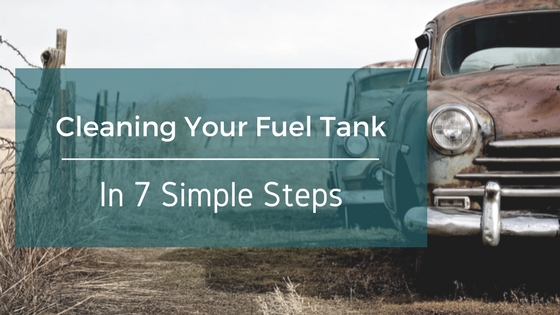One of the main causes of fuel pump and fuel filter failure has to do with the gas tank. If you think about it, thousands of gallons of gas go through your tank every year. It’s inevitable that some debris and sediment will end up in the tank, and rust will most likely develop as well. Cleaning your gas tank from time to time is an important task to help prolong the life of not only your fuel filter, but your engine overall.
7 Simple Steps to Cleaning Your Fuel Tank
Every engine enthusiast understands that preventing a problem is better than attempting to fix it afterward. Before you begin, you need to know how to clean your gas tank. Here are 7 simple steps to cleaning your gas tank, no matter what engine you’re working on.
1. Safety First!
Whenever you’re working with fuel systems, keep in mind that gas is highly combustible and can be dangerous. Here are a few safety tips before beginning the process of cleaning your gas tank:
- De-Clutter. Be sure to keep your work area clean and organized to help prevent an accident.
- Ventilate. If you are working indoors, be sure your work area is well ventilated – open up any doors or windows and set up a fan if needed.
- Be Prepared. Have a fire extinguisher on hand. Be sure there are no sources of flame or spark in the area.
- Mask up. Wearing a face mask is a good idea to help minimize the inhalation of fuel fumes.
- Protect your eyes. Never forget eye protection when working on your engine!
2. Drain the Tank
Before removing the tank, be sure it is empty of fuel. Not only is this a safety precaution, but it also takes some weight off, making the whole process easier. Some gas tanks have a drain cock, allowing the fuel to be drained neatly. If not, you can drain the fuel by removing a gas line or by syphoning it.
3. Remove the Tank
Depending on the type of engine, this may be simple or complex. Carefully remove the gas tank, but leave all valves and caps in position. This will make the re-install process much simpler later on. Once it is out, thoroughly inspect the entire tank; check for sediment, rust or any holes. Patch any holes before continuing.
4. Wash the Tank
Use an effective parts cleaner, such as try Berryman B-12 Chemtool Fuel System Cleaner (part #0116). Disperse the product over the entire inside surface of the tank by shaking or swirling it. Keep in mind, the majority of the buildup will be on the bottom, so focus most of your attention there. It may take a few soaking sessions to get the bottom completely clean, depending on the amount of buildup it has.
If you are working on a motorcycle and haven’t been able to remove the tank, you can still clean it effectively by using a combination of products. Use the same product, Berryman B-12 Chemtool Fuel System Cleaner, to address the bottom of the tank. Then use Berryman B-12 Chemtool Carburetor, Choke & Throttle Body Cleaner (part #0117 / #0117C ) by spraying it onto the sides of the tank.
5. Clean the Fuel System
To ensure all your tank-cleaning efforts don’t go to waste, be sure to run detergent-based fuel additive through your fuel system. Both Berryman B-12 Chemtool High-MileEdge Fuel System Cleaner Concentrate and B-12 Chemtool Total Fuel System Clean-Up are great options that will thoroughly clean up the fuel lines, carburetor, intake valves, and combustion chambers. This will prolong the life of your clean tank, and, in turn, help with any hard starting, rough idling, and hesitation issues.
6. Replace the Fuel Filter
This seems like common sense, but it is often overlooked. If you’re going through the effort of cleaning your tank and lines, replace the fuel filter as well. An old filter will restrict flow through your entire fuel system, making your fuel pump work harder and wear out faster. (Back to that “prevention” idea again!).
7. Put It Back
When replacing the tank after cleaning it, ensure all valves, caps and hoses are securely fitted. If there is even the slightest gas leak, it leaves the potential for environmental damage, or a fire.
Cleaning your gas tank properly ensures any dust, grime or other harmful materials don’t get into your engine and damage it. Maintenance also helps prevent fuel lines from clogging up, and keeps your fuel pump running stronger for longer. If your vehicle or engine has been sitting for a period of time or it’s simply running rough, it may be time to mask up and clean the fuel tank!
At Berryman Products, we are committed to producing the most effective and highest-quality products. We offer a wide selection of products to help all your engines stay in tip-top shape, and we are always ready and willing to answer any questions.

